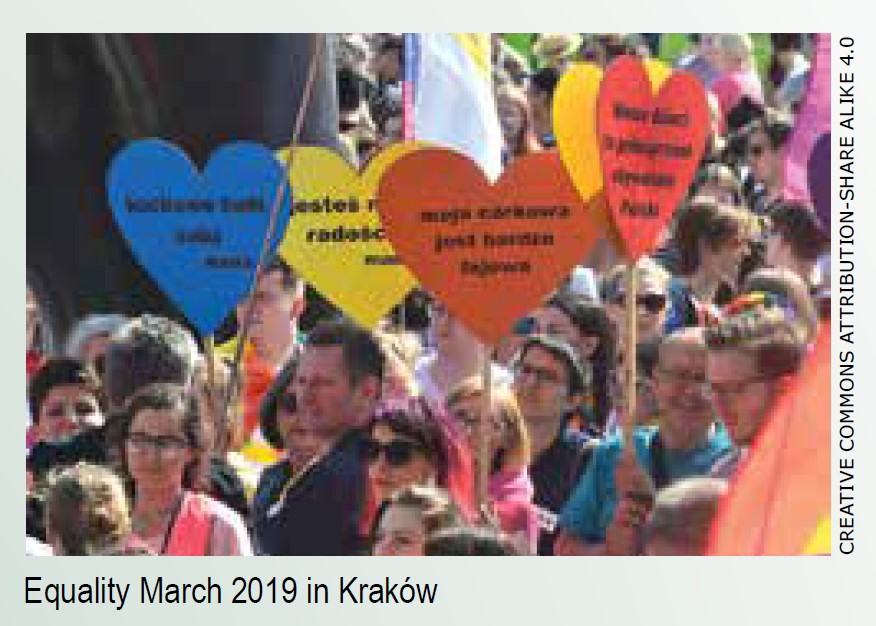
By John Lewis–
On a warm summer evening in 1987, I found myself hanging out in the heart of the medieval main square of Krakow, Poland, with my three new East German friends I had met a few hours before. As we passed around a bottle of Bulgarian red wine, we conversed about our lives in America and behind the Iron Curtain. It was the perfect final evening of my trip to the Soviet-bloc, a place I had long wanted to visit having grown up during the Cold War. The next morning, I would board a train to Vienna.
My East German friends were members of a theatre troupe and in town for an arts festival. They would return to East Berlin the next morning. Suddenly, one turned to me and said: “I would give anything to be with you on that train to Vienna tomorrow morning.” We all knew that the Eastern Bloc’s repressive travel restrictions forbid it.
Moments later, the exquisite hourly call of a trumpeter, atop the highest tower of St. Mary’s Catholic Church, reverberated across the square. Trumpeters have been sounding such a call live since the 1300s when it then announced the opening or closing of the old city’s gates.
What’s unique about the trumpeter’s call is that it stops abruptly midway through. Legend has it that centuries ago a trumpeter was announcing the closing of the gates to ward off an invading army, when an enemy soldier’s arrow pierced his throat and silenced him before he could complete the call.
That evening, Krakow’s main square was nearly silent, save the trumpeter’s call and the sound of our voices. Poles were suffering through a period of severe government repression; restaurants, bars, and shops were closed at the time of the evening. Just two years later, Poland would find itself at a crossroads when the Cold War unexpectedly ended.
Poland is now a member of the European Union and one of the largest recipients of the EU structural fund, but it once again stands at a crossroads. Poland’s far right Law & Justice Party is trying to establish an authoritarian, nationalist government based on their very conservative view of the values of the Roman Catholic Church and traditional Polish norms. They already control the presidency and the powerful lower house of Parliament. They have effectively seized control of the influential state media and for the last few years have been doing the same with the judiciary, a move the EU declared “a clear risk” to “the rule of law in Poland.”
This July, President Andrzej Duda’s successful re-election campaign demonized LGBTIQ people as its primary political weapon to attract and energize conservative voters. Duda invoked the virulent homophobia of deceased Pope (now Saint) John Paul II, who remains hugely popular in his native Poland. He quoted John Paul II’s declarations that being gay was an “intrinsic moral evil” and “objective disorder,” and same-sex marriage was “perhaps part of a new ideology of evil.”
Duda slandered the LGBTIQ movement as being more dangerous than communism, claiming that LGBTIQ “are not people, but ideology.” Like Russian President Vladimir Putin and Hungarian Prime Minister Viktor Orbán, Duda is an authoritarian leader who foments homophobia for his political gain, linking it to nationalist values and inspiring further hatred. Indeed, some 100 Polish locales covering about one-third of the country have passed “LGBT-free” or “LGBT Ideology-free” zones, authorizing banning of LGBTIQ rights marches and other events.
But Duda won re-election by a razor-thin 51% to 49% margin. And in response to Duda’s viciously homophobic campaign and policies, the LGBTIQ community and its allies have arisen in ways never seen before. Despite extremist violence and police brutality and unwarranted arrests, many thousands of people have participated in pro-LGBTIQ marches and demonstrations, most recently fueled by the weeks-long pre-trial detention of nonbinary activist Margot Szutowicz.

On August 30, thousands of people gathered for Krakow’s 16th annual Equality March in the historic main square, the same spot where my East German friends and I conversed late into the night 33 years earlier. They did so even though Krakow itself is in a regional “LGBT-free zone.”
As I reflect on events in Poland, I recall George W. Bush’s fomenting anti-gay hysteria against marriage equality as a political tool in the 2004 U.S. Presidential election. My mind also turns to the homophobic 2008 Proposition 8 campaign that, like Duda’s reelection, prevailed by a narrow margin, 52% to 48%.
After Prop. 8’s passage, something completely unanticipated and transformative took place. Across California and the nation, the LGBTIQ community and a broad cross section of the public awakened to rise, organize, and speak out against homophobia and hatred.
The situation for many LGBTIQ Poles seems dire today, and some are fleeing the country. Indeed, the future of Poland as a free state is on the line. But the awakening of widespread, fearless, and outspoken activism in support of LGBTIQ people and democracy has led some to term this summer’s events “Poland’s Stonewall.”
Poland is at a crossroads with LGBTIQ in the crosshairs. The Krakow trumpeter’s disrupted call warns of the threat of imminent danger. We hope this summer’s unprecedented outpouring of support for LGBTIQ people and democracy leads to a day when the trumpeter may complete its call, heralding Poland’s opening its doors to LGBTIQ equality, and indeed, the restoration of a free society.
Stuart Gaffney and John Lewis, together for over three decades, were plaintiffs in the California case for equal marriage rights decided by the California Supreme Court in 2008. Their leadership in the grassroots organization Marriage Equality USA contributed in 2015 to making same-sex marriage legal nationwide.
Published on September 10, 2020
Recent Comments